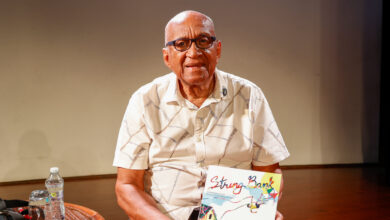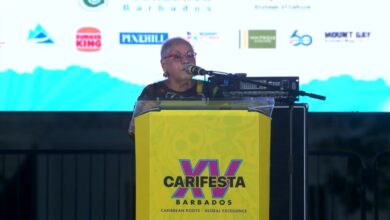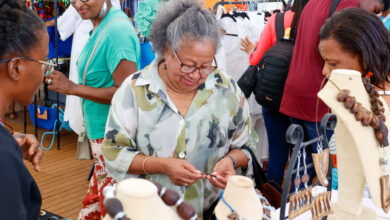The Hon. Dr. Frank Anthony, Minister of Culture, Youth and Sport
The Hon. Junia Regrello, Parliamentary Secretary, Trinidad and Tobago
Distinguished delegates of the Ninteenth Regional Cultural Committee
Members of the Interim Festival Directorate
Members of Staff of the CARICOM Secretariat
I have the distinct pleasure of welcoming Directors of Culture and other culture officials to the Nineteenth Meeting of the Regional Cultural Committee. I would like to say a very special thank-you to the Government of Guyana for graciously hosting this meeting, which comes at a critical juncture in the planning process and preparations for CARIFESTA X. We are especially pleased that Minister Anthony was able to join us for the opening of this Meeting.
Since the RCC was first established in 1988 as advisory body to Ministers of Culture in COHSOD, the RCC has lived up to and surpassed its mandate to provide advice on cultural policy and other matters related to cultural development in the region.
This body has been at the forefront of advocacy to mainstream culture in the regional integration process and in the sustainable development paradigm of the Region. The advocacy of the RCC, in collaboration with industry stakeholders, has led to greater attention and understanding on the part of our governments, of the regional imperative to develop our cultural industries as a strategy that is important not only to our economic viability, but also for developing stronger perceptions of ourselves, our identity and the value of our unique cultural expressions, as a people of remarkable creativity.
It has been demonstrated time and again that our cultural industries are renewable and sustainable; are fuelled by the creativity and dynamism of our youth, and are rooted in indigenous knowledge and intellectual capital. Many of our Member States have demonstrated that they have comparative advantage in the cultural industries, and have as a result, developed and advanced their unique national brand in the global imagination.
In this context, the Nineteenth RCC will have discussions on the composition and work programme of the Regional Task Force on Cultural Industries, mandated by both the Council for Human and Social Development, and the Council for Trade and Economic Development in 2007, and which is in the final stages of being established. This initiative represents significant progress in regional dialogue at the Ministerial level on this issue, of which the RCC can be justly proud.
On the agenda of the RCC for the past few years, has been the issue of the merger of the CARICOM Foundation for Art and Culture, established in 1994, and the CARIFORUM Cultural Support Fund, established in 2003. In both of initiatives, the Directors of Culture have played an instrumental role in their conceptualization, implementation and monitoring. We look forward to the advice of this body, on how to effectively conclude and advance the development of a consolidated fund, and to practical solutions and proposals for capitalizing the Foundation. Developing a sustained pool of resources to support a range of cultural projects and programmes in the region, from CARIFESTA and commemorative events of historical significance, to infrastructural development, continues to be a priority area that needs to be urgently addressed.
Yesterday I had the pleasure of welcoming delegates to the Sixth Meeting of the Interim Festival Directorate, an important transitional body set up by COHSOD to guide the implementation of the new CARIFESTA developmental model, in line with the Strategic Plan of 2004, and to provide expert advice to the Host Country of the Festival, on the delivery of CARIFESTA. I understand that the IFD meeting went on very late, as they looked indepth at the challenges and opportunities presented for CARIFESTA X, the systems already put in place for the Festival, and the ways in which we can all support the Host country.
We welcome back the seasoned and experienced professional, Dr. Carole Bishop, to complement the staff of the culture programme in the preparations for CARIFESTA X; we welcome the representatives of the artistic community on the IFD – Mr. Antonio Rudder from Barbados who is with us, and Mr. Adrian Augier from St. Lucia who sent his regrets that he would not be able to attend these meetings because of prior commitments. A special welcome to CARIFESTA stalwart, Mr. Henk Tjon from Suriname and to the very knowledgeable and experienced advocate for culture Carol Lawes, as two resource persons with extensive institutional memory, for these meetings; welcome also to Rawle Gibbons from Trinidad and Tobago; and we welcome Mr. Lloyd Stanbury, cultural industries expert, entrepreneur and legal consultant to the Secretariat on CARIFESTA.
Allow me to reiterate the appreciation of the Secretariat and indeed the entire Community to Guyana, and in particular President Bharrat Jagdeo, for so readily agreeing to fill the breach, when in July last, the newly elected Government of the Bahamas indicated that it was unable to undertake the task of hosting CARIFESTA X, as was previously announced at the Closing Ceremony of CARIFESTA IX. We can all view this as the “homecoming” for CARIFESTA, returning after some 36 years, to its birthplace. We expect CARIFESTA X to be no less inspirational and enjoyable as the first CARIFESTA, of which event many among us have very fond memories.
The RCC will review the recommendations of the IFD in respect of CARIFESTA X and agree on a timeline for the delivery of the Festival. Issues related to the establishment and financing of the permanent management structure of CARIFESTA, will also receive the attention of the Meeting.
We also look forward Minister, to attending and participating in what we are sure will be an exciting programme, to launch CARIFESTA X this evening, outside the Bank of Guyana Building. Our special thanks to the Governments of Suriname and Trinidad and Tobago, for providing performers and technical assistance in support of the launch.
The expert advice of the Directors of Culture will also be brought to bear on issues related culture, trade and the implementation of the CARICOM Single Market and Economy, and especially to the free movement of artists and cultural workers. Problems encountered by artists in freely moving with their tools of trade and creative works in the region still need to be addressed.
The CARIFORUM region recently concluded negotiations on an Economic Partnership Agreement with Europe, which has implications for the cultural sector, among many other sectors in our region. The RCC will advise on how best to realize tangible benefits for artists and cultural workers out of this agreement, and future trade agreements that will be negotiated on our behalf. The RCC has repeatedly called for greater consultation between trade and culture officials on trade matters relevant to the culture sector, and for the development of an appropriate culture-trade regional policy framework. The Second Joint Meeting of COTED and COHSOD, convened in Georgetown, Guyana in January of this year, endorsed this position, and we can look forward to greater collaboration on trade and culture matters between both Ministerial Councils, in the foreseeable future.
On a sad note, the Secretariat wishes to again place on record, the expression of its deep condolences to the family, the Government and people of Belize on the untimely passing of Mr. Andy Palacio, Deputy Administrator of the National Institute of Culture and History of Belize, on January 19, 2008.
A music icon, cultural activist and impassioned spokesperson for the Garifuna people of Central America, Andy Palacio was near and dear to us, as a member of this body of Directors of Culture. He was an active participant in the meetings and work programme of the RCC and showcased his incredible talent as a musician and as an administrator though his involvement in CARIFESTA. He will be greatly missed by all of us. A message from our Secretary General was delivered at his funeral in Belize in January.
In closing, I would like to say a very sincere thank-you to the Directors of Culture for your tireless advocacy, your stewardship and commitment to the development of our Caribbean culture; paradoxically having to work with small budgets and limited human resources, while tasked with the huge mandate of preserving, developing or promoting our cultural traditions and institutions, our national and regional identity, and the very essence of ourselves. In your capable hands as true custodians of our culture, we are confident that Caribbean culture can only increase in value, international recognition and impact.
Every good wish for fruitful deliberations.
Thank-you.





